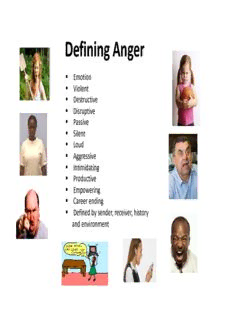
Defining Anger PDF
Preview Defining Anger
Defining Anger (cid:1) Emotion (cid:1) Violent (cid:1) Destructive (cid:1) Disruptive (cid:1) Passive (cid:1) Silent (cid:1) Loud (cid:1)(cid:1) AAggggrreessssiivvee (cid:1) Intimidating (cid:1) Productive (cid:1) Empowering (cid:1) Career ending (cid:1) Defined by sender, receiver, history and environment What Anger Could Look Like (cid:1) Self Talk (cid:1) Physical manifestations (cid:1) Sleep (cid:1) Grumbling (cid:1)(cid:1) FFrreeqquueenntt ccoommppllaaiinnttss (cid:1) Preoccupation (cid:1) Avoidance (cid:1) Criticism (cid:1) Feelings of helplessness Holding onto anger is like drinking poison and expecting the other person to die. …… Buddha Characteristics of anger ❑Gender interpreted ❑Culturally defined ❑Location significant factor ❑Defined at times by subjective interpretations ❑Physical component ❑❑FFeeeelliinngg ooff tthhrreeaatt,, iinnjjuussttiiccee,, hhuurrtt and/or attack ❑Self preservation Anger: Normal emotion not good or bad. Feeling hurt, injured, disappointed, threatened (real or perceived) or fear. Is a feeling and does not necessarily lead to anything else. May or may not be outwardly expressed Aggression: Action or behavior that results in verbal, emotional, or physical attack on a person or object. May be reactive or planned. Goal is not always to cause direct harm. Control or dominance is usually desired outcome. HHoossttiilliittyy:: CCoonnssiisstteenntt ssttaattee oorr aattttiittuuddee.. Rage: Rage is the accumulation of unexpressed anger and perceived disrespectful transactions that after multiple “stuffings” finally flow to the surface. Violence: Usually goal oriented with intent to harm. Usually physical in nature. Predatory or reactive 1.Emotional part of brain (limbic system) is being utilized at expense of thinking part(Cortex) 2. Amygdala hijacks messages , overrides cortex. 3. Hormones released (hormonal flush) 44.. IItt ccoouulldd ttaakkee uupp ttoo 2200 mmiinnuutteess ttoo ggoo ffrroomm anger state of arousal to calm (cid:1) Response to environment creates a message sent out to our body (cid:1) Body reacts, hormones released (cid:1)(cid:1) NNeeuurroonnss iinn tthhee hhyyppootthhaallaammuuss ccoommpprroommiisseedd (cid:1) Jeopardizes the brain’s ability to slow down (cid:1) Lowers serotonin levels (cid:1) Anger blocks the growth of new neurons in the brain (cid:1) Information between integral parts of brain impacted, especially the Prefrontal Cortex 2.Pituitary glands release fight or flight 1.As anger rises the hormones including hypothalumus in the 3. Hormones affect adrenalin . brain stimulates the the cardio system pituitary glands 4. Heart races, blood 5. Sugar glucose is pressure and body released into the temp rise as lungs blood providing struggle to take on eexxttrraa eenneerrggyy.. mmoorree ooxxyyggeenn 7. If anger does not 6. Blood is diverted subside and to limps (fight or hormones continue flight) and to the to surge, creates brain(think more cumulative stress on rapidly). body. 1.Right a wrong 22.. PPrrootteecctt yyoouurr sseellff 3. Hurt (rejection) 4. Loss of control
Description: